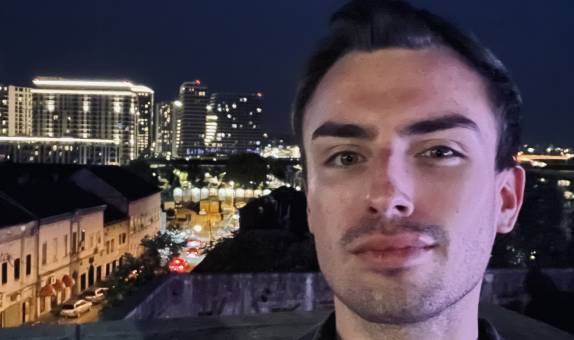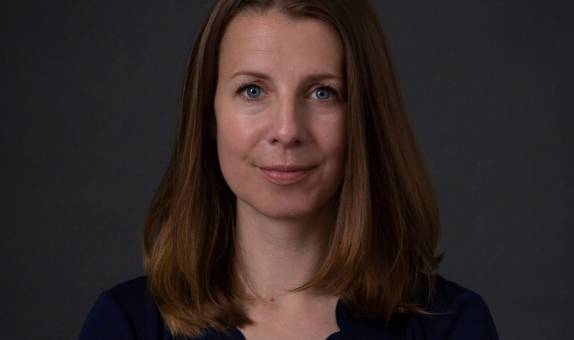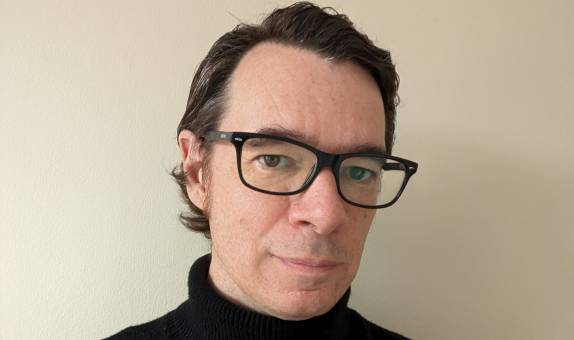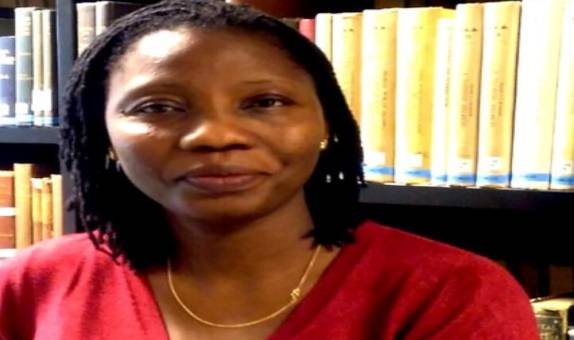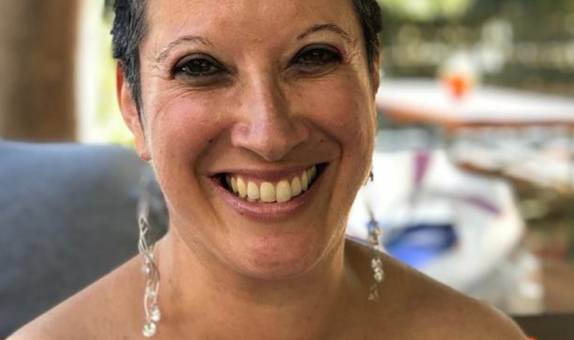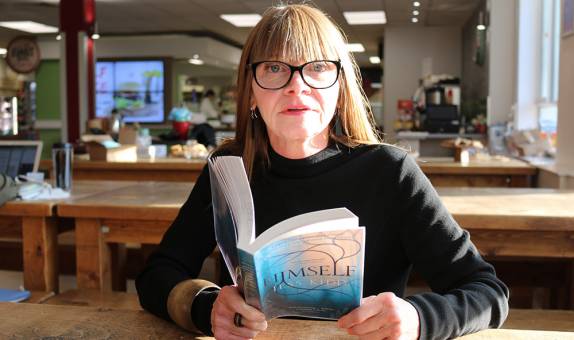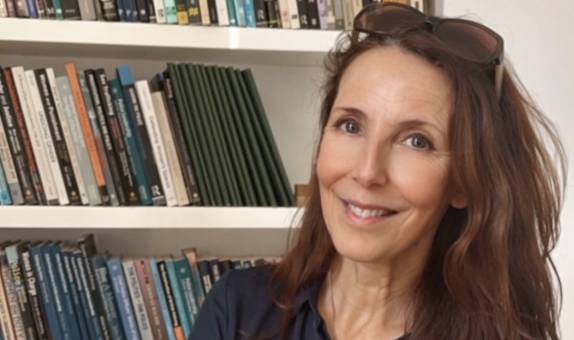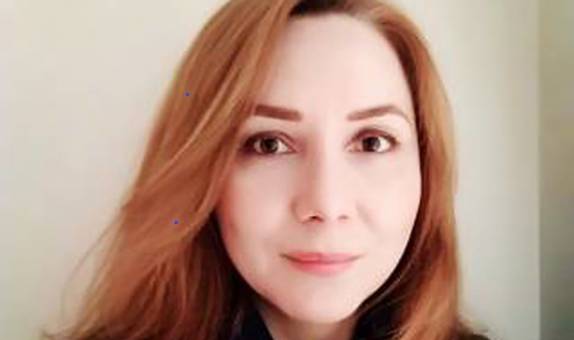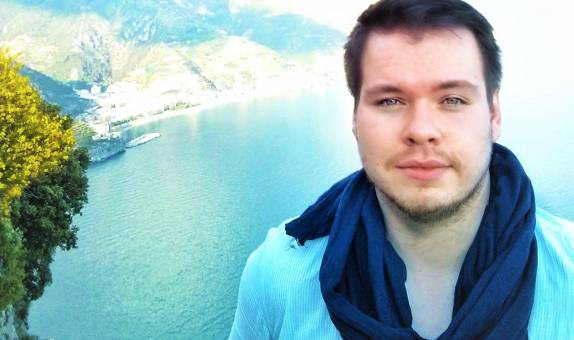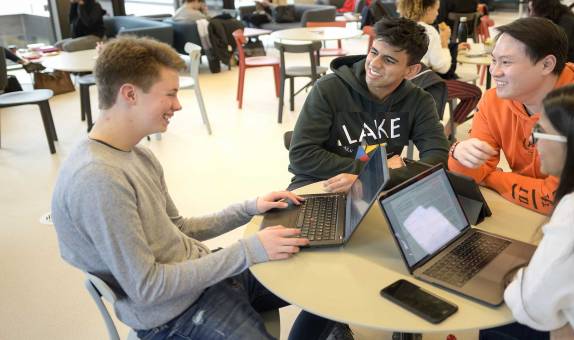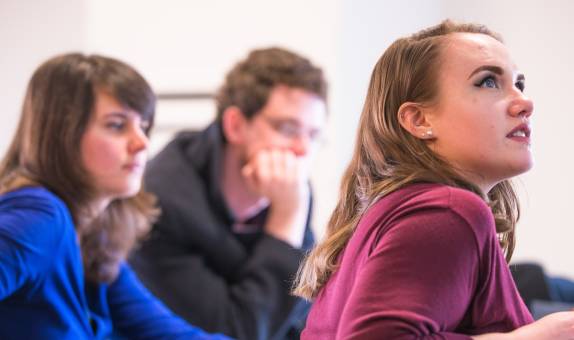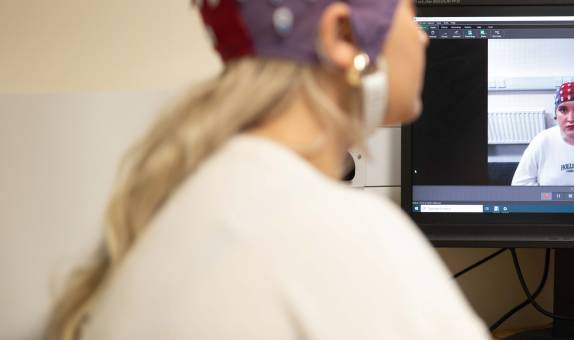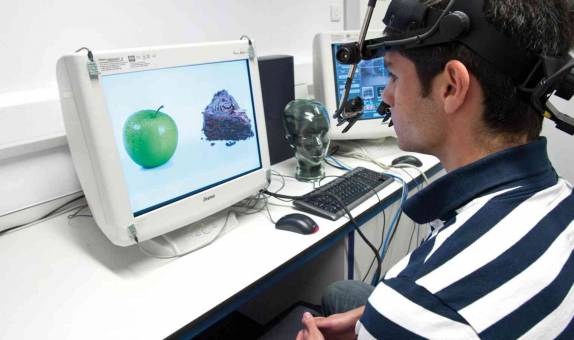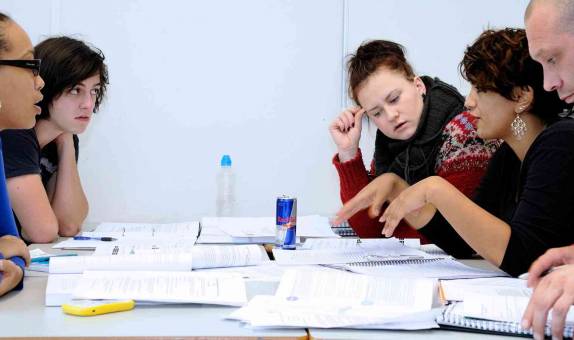Criminology BSc (Hons)

Teaching Excellence Framework (TEF) Gold award
Our commitment to high quality teaching has been recognised with a TEF Gold rating. The University has received an overall rating of Gold, as well as securing a Gold award in the framework's two new student experience and student outcomes categories.
Why choose this course?
Criminology is the study of crime, its control and its consequences. It combines the study of politics, law, psychology, society and culture to understand processes of criminalisation, practices of crime control and prevention.
You'll study patterns and perceptions of crime, both nationally and globally, the impact of different practices of punishment on offenders, issues of diversity and discrimination in criminal justice, and police power and culture. You can also explore youth justice, new technologies of risk management, crime prevention, terrorism and security.
You'll be introduced to the theoretical perspectives and debates that inform criminology, and to the institutions, processes and legal foundations of the criminal justice system in England and Wales.
| Attendance | UCAS code/apply | Year of entry |
|---|---|---|
| 3 years full time | L311 | 2024 (Clearing) 2025 |
| 4 years full time including foundation year | L312 | 2024 (Clearing) 2025 |
| 4 years full time including sandwich year | L313 | 2024 (Clearing) 2025 |
| 6 years part time | Apply direct to the University | 2024 (Clearing) 2025 |
Please note: Teaching on this course may take place on more than one KU campus.
| Main Location | Penrhyn Road |
Reasons to choose Kingston University
- Through a work placement or volunteering option, you'll be able to practise your skills and gain valuable experience for your future career.
- Fieldwork may include court observations, crime scene house, empirical research, and case study analysis, allowing you to apply theory to real-life situations.
- Kingston has good connections with criminal justice organisations, international NGOs, charities, and governmental organisations.
- We have a comprehensive programme of guest speakers, from detective sergeants and undercover operatives, to probation officers and NGO founders, who share their insights and experiences.
- 96.6% of students thought the library resources supported their learning (NSS 2023).
Kingston's Department of Criminology, Politics and Sociology
What you will study
Take a look at some of the content and modules that you may have the opportunity to study on this course:
Year 1
Year 2
Optional year
Sandwich year
Final year
In Year 1, you will be introduced to a range of theoretical perspectives and debates that inform criminology, and the institutions, processes and legal foundations of the criminal justice system in England and Wales. You will learn about how social order is produced and reproduced and the relationship between formal criminal justice institutions and wider practices of social control. You'll understand how researchers utilise qualitative and quantitative research methods and will gain hands-on experience of research skills.
Core modules
Foundations in Criminological Theory
30 credits
This module will introduce students to a range of theoretical perspectives and debates that inform criminology, and which underpin their learning throughout the criminology programme. Theories will be evaluated in relation to academic scholarship, empirical evidence, popularity and application in crime policy and practice, and in relation to their geographical, social, cultural, historical locations.
Students will learn about a changing and dynamic field of study, which has encompassed both positivistic and social analyses of crime and criminalisation. They will learn to evaluate criminological theory in relation to a range of intellectual movements. They will be encouraged to understand criminological theory in relation to shifts across allied subjects like sociology, gender studies, critical race studies, social policy, politics and psychology.
Crime, Law and Justice
30 credits
This module will provide students with an introduction to the institutions, processes and legal foundations of the criminal justice system in England and Wales. The module is core to the undergraduate degree. The module familiarises students with the language and reasoning of the criminal law and the structure and chronology of the criminal justice process. There is an emphasis on the development and practice of key academic skills especially information retrieval.
Social Order and Social Control
30 credits
We live in a diverse society: we all have different opinions, values, goals, abilities, and want different things out of life. So how do we all manage to get along, how does society hold together? This module explores the ways in which societies attempt to impose a shape on themselves, to keep order and reproduce their values and structures. We will look at both the formal and informal, proactive and reactive measures through which societies try to control their members, and what happens when people resist those controls. We will also ask questions about the politics, powers and interests that underlie attempts to shape society in particular ways.
Introduction to Research Methods
30 credits
This module will focus your attention on how social scientists have utilised a range of qualitative and quantitative methods to research social life in its various forms. This module grounds your understandings of research methods through the practical application of data collection and analysis, and critical reflection on the research process. You will gain hands-on experience of research skills throughout the module that can be applied to future study and employability.
You will also be introduced to Future Skills through engagement with Navigate; an innovative programme designed to support your personal and professional development, and your ability to articulate your skills and graduate qualities in an external context.
In Year 2, you'll develop critical insight into key issues and controversies in the delivery of justice, social control and punishment. You will explore the different ways of approaching criminology and assess how these different approaches relate to different kinds of criminological methods. Alongside this you will build upon your existing research skills. You will have the opportunity to specialise in your main interests via a choice of modules.
Core modules
Criminal Justice: Policing, Prisons and Punishment
30 credits
This module provides you with a critical insight into key issues and controversies in the delivery of justice, social control and punishment. It encourages you to think critically about the role of the state in the regulation of behaviour and provides an overview of key changes that have occurred in the field of crime control and criminal justice. The first part of the module is dedicated to developing understanding of the concepts of 'policing' and the 'police'. Key issues confronting contemporary policing are explored together with an enhanced awareness of the historical context within which contemporary policing has developed.
Debates about policing are situated within broader debates of social control and governance, with a critical appreciation of the police function and role. It also considers the implications of globalisation for policing both at an organisational and conceptual level. The second part of the module provides you with the opportunity to undertake a critical examination of contemporary debates on the purpose of punishment. You will be introduced to a range of theoretical perspectives and debates on the use of punishment to address criminality and will consider the purpose of punishment in modern societies. This will be accompanied by an examination of different forms of punishment including an in-depth exploration of the use of imprisonment and comparative penal systems.
Researching Law and Society
30 credits
Legal rules, norms, systems, institutions and processes are central to the construction and governance of human societies. At the same time, social conventions, relationships and values are fundamental in the practice of defining acceptable and unacceptable behaviour in society, and in criminalising particular forms of activity. Understanding the relationship between law and society is therefore central to both sociology and criminology. Law as a social phenomenon also generates a wide range of data sources of tremendous value to researchers seeking better understanding of many aspects of social life. In this module you will explore a range of the research methodologies used to study the impact of law on society. You will also study the relevant theoretical approaches to socio-legal studies. In doing so, you will build on the research skills you developed at level 4 and apply selected methods in socio-legal research by reflecting critically on a specific research problem and producing a short piece of empirical research. Later in the module you will produce a research proposal in preparation for your final year dissertation. On completion of the module you will have consolidated your core research skills based on the application of research methods in particular contexts. You will also have demonstrated the ability to plan, design and conduct a piece of independent research.
Optional modules
Diversity and Discrimination in the Criminal Justice System
30 credits
This module will enable students to contextualise criminology's past and present engagement with diversity and discrimination. The relationship between crime and discriminatory processes will be explored within different contexts such as within the law, prisons and cultural practices (e.g. FGM). The responses of the criminal justice process to diversity will also be discussed and evaluated with regard to institutional racism and domestic abuse. In addition, students will critique the gendered social construction of the categories of 'offender' and 'victim'. This will be further challenged by the exploration of female membership and affiliation with criminal gangs and their perpetration of crimes, and male victims of sexual violation.
Youth Crime
15 credits
This module considers what is understood by the term youth, as a social category and life stage, and explores young people's lived experiences. As such, it examines the history of youth culture and subcultures and styles, and critically considers the notion of ‘problem' youth and societal responses to this including intervention and multi-agency working. Bringing together sociological, criminological and cultural studies theory from Level 4, the module considers youth from both an individual and structural view point. We will also look at how we have come to deal with young offenders in the youth justice system and considers the contradictory messages about welfare, diversionary measures, human rights, punitive justice, managerial and crime prevention discourses and strategies.
Securing Human Rights: Contemporary Themes and Issues
30 credits
This module introduces the contested and evolving relationships between the theory and practice of securing human rights. It starts with an overview of key frameworks and mechanisms designed to secure rights at the international, regional and domestic levels. A central feature of the module is to introduce current critical themes, from which issues can be dissected and analysed through a range of contemporary and international case-studies. Key themes of the module may include (but are not limited to): human rights and populism, people on the move, free speech in a changing word, truth, justice and reconciliation', etc.
The module concludes by asking: what is the future for human rights?
Crime on Screen
15 credits
Crime on screen critically analyses the explosion of the true crime genre. Both new and old media are instrumental in our understandings of crime and the criminal justice system, but agendas change, and the framing of crime can be sensationalised, factually incorrect (trial by media) and/or insensitive to victims. We have seen with the explosion of crime on screen, the commodification of crime for entertainment which can distort the reality of our criminal justice system.
Research has argued that true crime is correlated with an increased fear of being a victim of crime and more punitive justice, as well as a distrust for the criminal justice system (Kort-Butler and Sittner Hartshorn, 2011) with miscarriages of justice gaining attention on streaming services like Netflix (When They See Us, 2019) and law enforcement questioned (Making a Murderer, 2015–2018). Crime on screen not only allows us to watch, but sometimes act, with internet sleuths taking it upon themselves to solve crime (Netflix's Don't F**K with Cats, 2019). Crime on screen and via podcasts continues to grow in popularity, even having its own genre on Netflix with research suggesting women are drawn to crime on screen more than men.
Globalisation, Development and Social Justice
30 credits
This module provides an introduction to key concepts, debates and historical processes that surround the project of development in the global age. We explore ideas that are intrinsic to the way we think about development today in the historical contexts in which they arose and were fought over. We also examine how globalisation and development have reshaped our relationship to the earth at particular moments, and the often unintended environmental and social consequences of development.
Throughout this module, you will be encouraged to think creatively and expansively about how to tackle some of the most challenging issues that face us today. You'll hear from consultants, activists and campaigners working in the development sector, and learn how to ‘read the economy' not as an economist, but as a student of politics, international relations, human rights and social justice.
Culture and Harm in the Digital Age
15 credits
The world is entering an unprecedented era – the digital age. It will soon become impossible to think about the personal life, society and politics outside digital technologies, such as the internet, social media, artificial intelligence (AI), smart things and smart environments. Future jobs will require not only the awareness of digital technologies but also the knowledge of concepts which explain the links between digital technology on society. This module will equip students with a solid basis to understand the digital age, developing their digital literacy and promoting digital citizenship.
You will explore the new forms of culture and harm that are emerging in the digital age. What is the future of fashion in the digital age? How does digital technology support urban countercultures and social movements? What forms of new cyber threats are emerging? Will algorithms perpetuate and deepen racism and gender discrimination? You will learn about the ways in which digital technology can be used to minimise social harm: assist crime reduction, preserve cultural heritage from destruction in wars, offer environmentally sustainable solutions to everyday life helping prevent climate change. You will also learn about the ways in which digital technology can cause social harm: contribute to poor mental health, eating disorders and distorted body image, violate privacy, commodify user behaviour, replace humans creating joblessness and be used to suppress political opposition.
Crime Prevention and Community Safety
15 credits
Crime prevention is a fundamental part of modern policing and is the subject of a range of specialist research and theorising and an associated body of legislation and practice. The Crime and Disorder Act 1998 requires local authorities to enter into partnerships with the police and a range of other ‘responsible authorities' in order to reduce crime and disorder in communities. These ‘community safety partnerships' have a duty to assess risk and potential harms to the community and to engage with the public in the process of setting the priorities for local action plans to reduce those risks and harms. This module will guide students through the history, theory and practice of crime prevention, exploring its intellectual and political roots and critically analysing its effectiveness and impact.
Study abroad optional year
You have the option to take an additional year to study abroad or to undertake a year-long work placement overseas (or even a mix of both.)
This course has a sandwich year option which takes place between Year 2 and your Final year. During this sandwich year you will take a placement within a relevant setting, ensuring you gain essential experience to add to your CV and help you secure a graduate job.
In your Final year, you will be introduced to relevant issues within the realm of globalisation, terrorism and international crime. You will undertake an advanced research project on a topic of interest and receive training in research skills. You will also choose from a range of specialist modules that suit your area of interest.
In this year, you will have a choice of Option A or Option B.
- For Option A, your core modules will be Transnational Crime and Criminology Dissertation. You will then select 60 credits in optional modules.
- For Option B, your core modules will be Transnational Crime and Criminology Extended Dissertation. You will then select 30 credits in optional modules.
Core modules
Transnational Crime
30 credits
The aim of the module is to introduce you to relevant issues within the realm of globalisation and transnational crime: e.g. terrorism, environmental crime, piracy, human trafficking, criminal networks and cybercrime. It will enable you to develop a detailed comprehension of the complexity of these criminogenic experiences.
The course opens with consideration as to what transnational crime is and how it is researched. Various topics are then examined to illustrate the dimensions of transnational crime over the following weeks. Topics include organized crime; sex trafficking and pornography; illegal markets; problems caused by crimes against the environment and the role of technology in perpetrating crime across the globe. Politically motivated crimes such as terrorism are considered, including the interaction between terrorist discourses and the media, the work of international law enforcement bodies in relation to global security and counter-terrorism. Alongside the structural and political aspects of crime, the module also considers interpersonal and cultural experiences of harm, for example, violence against women and honour-based violence.
Criminology Extended Dissertation
60 credits
Through this module you will develop your own criminological specialism by conducting an extended and in-depth study on a topic of your choosing. Students will be tutored in the skills necessary to successfully complete a final year dissertation and will work with a staff supervisor to develop a critical understanding of their research topic. You will work with other students to organize a conference at which you will all present your work, thereby learning the skills of event organization and management as well as having an opportunity to disseminate their dissertation to a wide audience. This module will be an opportunity for you to gain hands-on experience of research skills that can be applied to future postgraduate study and careers in human resources, marketing, public sector and charitable and non-government organisations.
Criminology Dissertation
30 credits
Through this module you will develop your own criminological specialism by conducting an extended and in-depth study on a topic of your choosing. Students will be tutored in the skills necessary to successfully complete a final year dissertation and will work with a staff supervisor to develop a critical understanding of their research topic. You will gain hands-on experience of research skills that can be applied to future postgraduate study and careers in human resources, marketing, public sector and charitable and non-government organisations.
Optional modules
Applied Social Science: Work and Volunteering
30 credits
This is a level 6 optional module that draws upon social science debates and knowledges. Students will learn by observing and undertaking work-based practice. The principle underlying this module is that worksites are important contexts for students to test, validate, expand upon, supplement and enrich their academic learning. The module requires students to undertake a minimum of 40 hours of fieldwork in an organisational setting. The form that the fieldwork will take will depend upon the type of placement secured, but, typically it may involve interning, shadowing or volunteering in subject relevant placements (for example across social justice, criminal justice/crime prevention, welfare and support fields). Whilst in their placements students are encouraged to think about the social aspects of organisations and working life, including their structural forms, interpersonal relationships and their practices. Students will be supported in securing their placement at level 5 in preparation for the commencement of the module at level 6.
Risk and Crime
30 credits
This module explores the rise of risk and insecurity in relation to crime as a condition of existence in late/post modernity. Risk is a dynamic and fluid concept. It currently dominates our lives and this module examines risk-taking and risk strategies in the domains of crime and criminal justice. Risks from, for example, gun crime, knife crime, terrorism, fraud, hate crime, youth crime, domestic violence, sexual abuse, corporate crime and internet crime are major concerns. In recent years, the governance of crime (from policing and crime prevention to sentencing and prison organisations) has moved away from a focus on reforming offenders towards preventing crime and managing behaviour using risk techniques.
Contemporary social theorists (such as Ulrich Beck and Anthony Giddens) argue that the predictability, certainty and security that were characteristics of modern society are being questioned in contemporary societies. This results in a world that is increasingly perceived as uncertain and dangerous and in which ‘risk' is endemic. This module provides a forum in which the issues of risk as they are associated with crime can be debated and subjected to empirical scrutiny. In order to explore risk in contemporary crime governance and risk in criminal activity students will examine theoretical perspectives and political approaches.
Students are required to examine theories their own assumptions about risk and crime in terms of theoretical approaches, to undertake a fieldwork analysis about risk and criminal justice and to write a case study on an area of risk and crime of their own choosing.
Criminology and the Law
15 credits
This module brings criminological theories and perspectives to bear on the uses of criminal law in contemporary societies. Students will have the opportunity to think critically about selected current and emerging topics in criminal law and explore how the relationship between the elements of crimes and the processes of criminalisation change over time.
As new technological developments present challenges to existing frameworks in criminal law, offending behaviour in cyberspace and the uses of artificial intelligence in the delivery of criminal justice raise important criminological issues in law reform. Similarly, popular and media narratives about social disorder often expose the limits of the criminal law and how such limits may be justified – should the criminal law have a place in the construction of the self and identities in public and private spheres?
The module examines a range of current and emerging problems that raise questions about law and power in crime control, individual autonomy and consent, security and liberty in criminalisation and decriminalisation, surveillance technology in law enforcement, and the protection of vulnerable groups.
Genocide and Crimes Against Humanity
30 credits
This module will be examining some deeply troubling events in recent history and politics and the various ethical, legal and political responses that they have generated. It has been argued that the Holocaust was a critical turning point, a catastrophe which required a fundamental ethical, legal and political rethinking of how the rights of human beings could be protected when states in the modern world engage in the systematic attempt to murder large numbers of people, including many of their own citizens.
The module begins with reflections on the Nazi attempt to eliminate a whole group of people (the Jews) and to murder and enslave millions of others. It then considers a range of responses, including the Nuremberg trials, the Genocide Convention, and the Universal Declaration of Human Rights. It examines a number of cases of genocide and crimes against humanity that have nevertheless occurred subsequently. It evaluates the repeated failure for decades to halt or prevent these crimes and then considers the rethinking caused by the genocides in Yugoslavia and Rwanda, and the setting up of ad hoc tribunals and an International Criminal Court to prosecute perpetrators and provide justice to victims.
It concludes with reflections on how much progress has been made in protecting citizens in a world of sovereign nation states and what forms of justice can work after such crimes have been committed. These are highly contested questions and the module is designed to encourage the critical analysis and evaluation of a wide range of arguments that have been put forward from a variety of perspectives.
Please note
Optional modules only run if there is enough demand. If we have an insufficient number of students interested in an optional module, that module will not be offered for this course.
Foundation year – Social Sciences
If you would like to study this degree at Kingston University but are not yet ready to join the first year of a BSc (Hons) course, you may want to consider studying this course with a foundation year.
Future Skills
Knowledge to give you the edge
Embedded within every course curriculum and throughout the whole Kingston experience, Future Skills will play a role in shaping you to become a future-proof graduate, providing you with the skills most valued by employers such as problem-solving, digital competency, and adaptability.
As you progress through your degree, you'll learn to navigate, explore and apply these graduate skills, learning to demonstrate and articulate to employers how future skills give you the edge.
At Kingston University, we're not just keeping up with change, we're creating it.

Kingston School of Law, Social and Behavioural Sciences
The School offers courses in economics, sociology, law, psychology and criminology. Our degrees are underpinned by a vibrant research culture and delivered by a blend of practitioners and academics who are dedicated to equipping you with the employability skills to thrive in your career.
You will have a wealth of opportunities outside the classroom to further your learning and gain hands-on experience in your chosen field.
Social Sciences Café
Social Sciences Café (SSC) is a series of events within the Department of Criminology, Politics and Sociology (CPS) which aims to help prepare students for life after graduation. Students can take part in seminars on employability skills and postgraduate studies; speaker and panel events on topical issues that engage the broader Kingston University (KU) community; and social events linked to key moments in the academic calendar.
SSC is often visited by KU graduates working in the public, private and third sector in the UK and around the world, who are keen to share their career journeys and advice for students at an early stage of their career planning, as well as professionals for ‘meet the employer' advice and networking sessions.
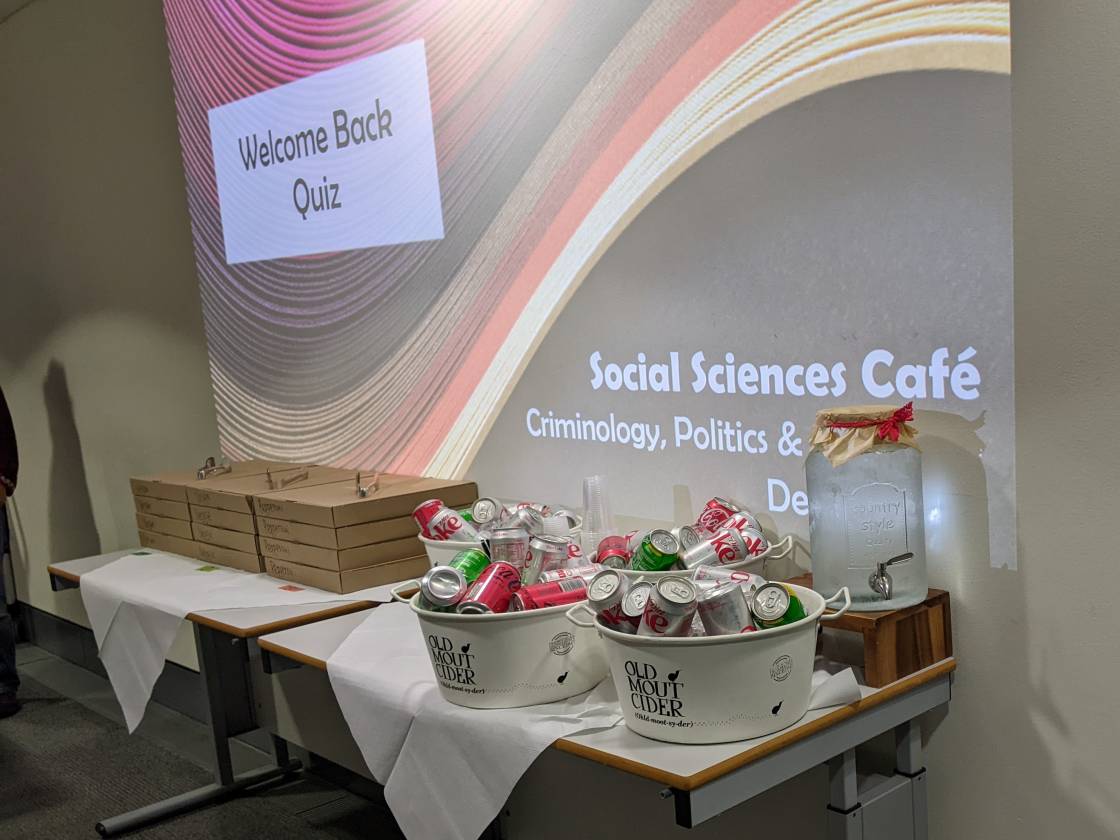
After you graduate
Graduates work in criminal justice and advocacy, the Police, HM Prison and Probation Service, youth offending teams, the Prison Reform Trust, crime research, health, housing and welfare, human resources, teaching, local and central government.
In order to help you achieve your goals and develop the necessary experience and skills, we have an internship module, the option of a placement year, and a range of authentic assessments which mimic real world tasks relevant to future employment.
We have guest speakers from a range of relevant organisations and we have set up a form of community-engaged learning, where real world organisations set our students a live brief as part of their assessment. By completing this assessment, our students are not only learning vital skills for work, but also helping the organisation achieve part of their mission. To date we have worked with local government, charities working on supporting and reintegrating offenders, and campaign organisations.
Specialist careers support
You will take part in an Assessment Centre Experience, providing the opportunity to experience the pathway to employment with tailored feedback to help develop your employability skills for the world of graduate employment.
- Develop your understanding of the jobs market, including current trends and opportunities, different recruitment processes and how to identify relevant roles
- Receive personalised feedback reports to help you to improve and progress
- Access additional webinars on top tips, employer expectations and best practice

Life on this course: Trip to the London Dungeon
Students celebrated the end of term by delving into the historical perspectives of punishment and justice in the Capital.
This fun visit brought to life London's most famous criminals, such as Jack the Ripper, and students experienced what a Crown Court was like in the past.

Entry requirements
If you would like to join us through Clearing 2024, please call our Clearing line on 0800 0483 334 (or +44 020 8328 1149 if you are calling from outside the UK) and speak to our friendly and knowledgeable hotliners who will be able to provide information on available courses and will guide you through your options.
Please note the entry requirements listed below are for 2025 entry only.
Teaching and assessment
Timetabled learning and teaching on this course includes lectures, small group tutorials and seminars.
Who teaches this course?
You will be taught by an experienced teaching team whose expertise and knowledge are closely matched to the content of the modules on this course. The team includes senior academics and professional practitioners with industry experience. Postgraduate research students may also contribute to the teaching of seminars under the supervision of the module leader.
The following group of staff members are currently involved in the delivery of different elements of this course. This pool is subject to change at any time within the academic year.
Course fees and funding
Additional costs
Depending on the programme of study, there may be extra costs that are not covered by tuition fees which students will need to consider when planning their studies. Tuition fees cover the cost of your teaching, assessment and operating University facilities such as the library, access to shared IT equipment and other support services. Accommodation and living costs are not included in our fees.
What our students say
Key information set
The scrolling banner(s) below display some key factual data about this course (including different course combinations or delivery modes of this course where relevant).
Course changes and regulations
The information on this page reflects the currently intended course structure and module details. To improve your student experience and the quality of your degree, we may review and change the material information of this course. Course changes explained.
Programme Specifications for the course are published ahead of each academic year.
Regulations governing this course can be found on our website.




